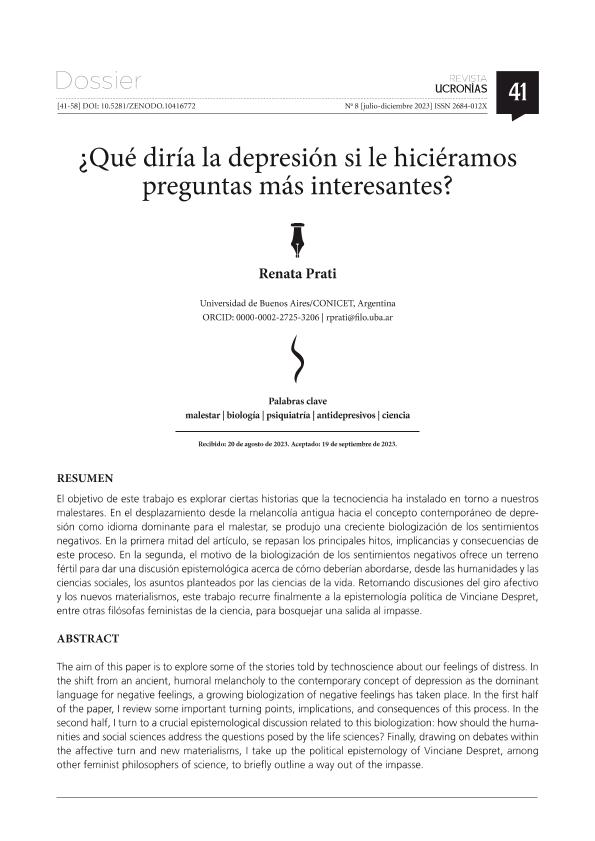Mostrar el registro sencillo del ítem
dc.contributor.author
Prati, Renata

dc.date.available
2024-04-26T15:55:46Z
dc.date.issued
2023-12
dc.identifier.citation
Prati, Renata; ¿Qué diría la depresión si le hiciéramos preguntas más interesantes?; Colaboratorio Universitario de Ciencias, Artes, Tecnología, Innovación y Saberes del Sur; Ucronías; 8; 12-2023; 41-58
dc.identifier.issn
2684-012X
dc.identifier.uri
http://hdl.handle.net/11336/234124
dc.description.abstract
El objetivo de este trabajo es explorar ciertas historias que la tecnociencia ha instalado en torno a nuestros malestares. En el desplazamiento desde la melancolía antigua hacia el concepto contemporáneo de depresión como idioma dominante para el malestar, se produjo una creciente biologización de los sentimientos negativos. En la primera mitad del artículo, se repasan los principales hitos, implicancias y consecuencias de este proceso. En la segunda, el motivo de la biologización de los sentimientos negativos ofrece un terreno fértil para dar una discusión epistemológica acerca de cómo deberían abordarse, desde las humanidades y las ciencias sociales, los asuntos planteados por las ciencias de la vida. Retomando discusiones del giro afectivo y los nuevos materialismos, este trabajo recurre finalmente a la epistemología política de Vinciane Despret, entre otras filósofas feministas de la ciencia, para bosquejar una salida al impasse.
dc.description.abstract
The aim of this paper is to explore some of the stories told by technoscience about our feelings of distress. In the shift from an ancient, humoral melancholy to the contemporary concept of depression as the dominant language for negative feelings, a growing biologization of negative feelings has taken place. In the first half of the paper, I review some important turning points, implications, and consequences of this process. In the second half, I turn to a crucial epistemological discussion related to this biologization: how should the humanities and social sciences address the questions posed by the life sciences? Finally, drawing on debates within the affective turn and new materialisms, I take up the political epistemology of Vinciane Despret, among other feminist philosophers of science, to briefly outline a way out of the impasse.
dc.format
application/pdf
dc.language.iso
spa
dc.publisher
Colaboratorio Universitario de Ciencias, Artes, Tecnología, Innovación y Saberes del Sur
dc.rights
info:eu-repo/semantics/openAccess
dc.rights.uri
https://creativecommons.org/licenses/by-nc-sa/2.5/ar/
dc.subject
Malestar
dc.subject
Biología
dc.subject
Psiquiatría
dc.subject
Antidepresivos
dc.subject.classification
Otras Filosofía, Étnica y Religión

dc.subject.classification
Filosofía, Ética y Religión

dc.subject.classification
HUMANIDADES

dc.title
¿Qué diría la depresión si le hiciéramos preguntas más interesantes?
dc.type
info:eu-repo/semantics/article
dc.type
info:ar-repo/semantics/artículo
dc.type
info:eu-repo/semantics/publishedVersion
dc.date.updated
2024-04-24T12:48:15Z
dc.journal.number
8
dc.journal.pagination
41-58
dc.journal.pais
Argentina

dc.journal.ciudad
Ciudad Autónoma de Buenos Aires
dc.description.fil
Fil: Prati, Renata. Consejo Nacional de Investigaciones Científicas y Técnicas; Argentina. Universidad de Buenos Aires; Argentina
dc.journal.title
Ucronías
dc.relation.alternativeid
info:eu-repo/semantics/altIdentifier/url/https://ucronias.unpaz.edu.ar/index.php/ucronias/article/view/192
Archivos asociados
